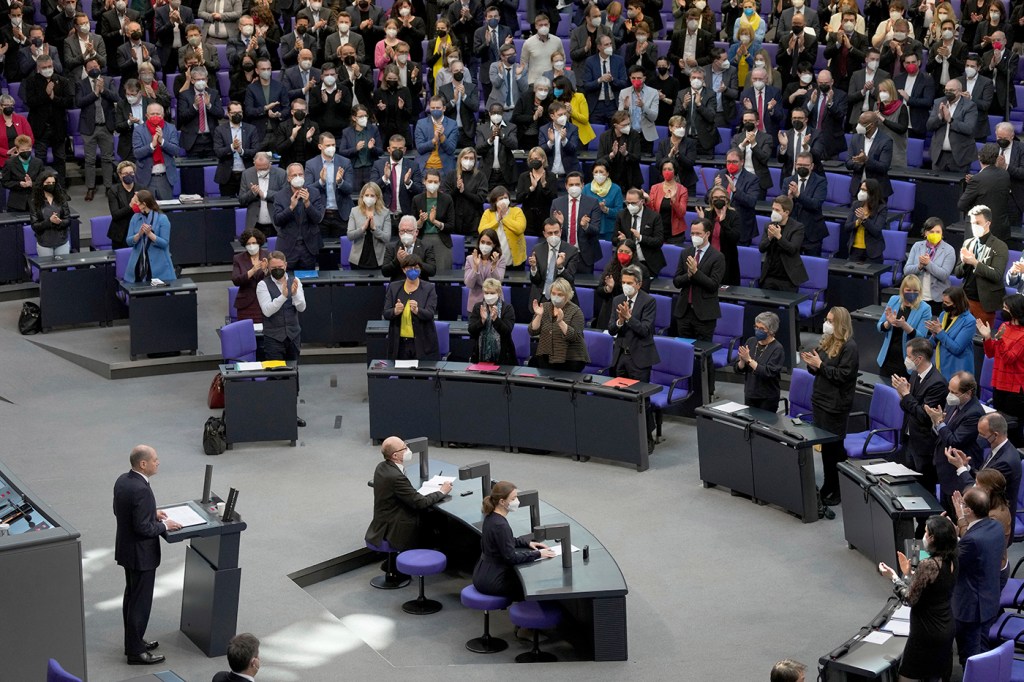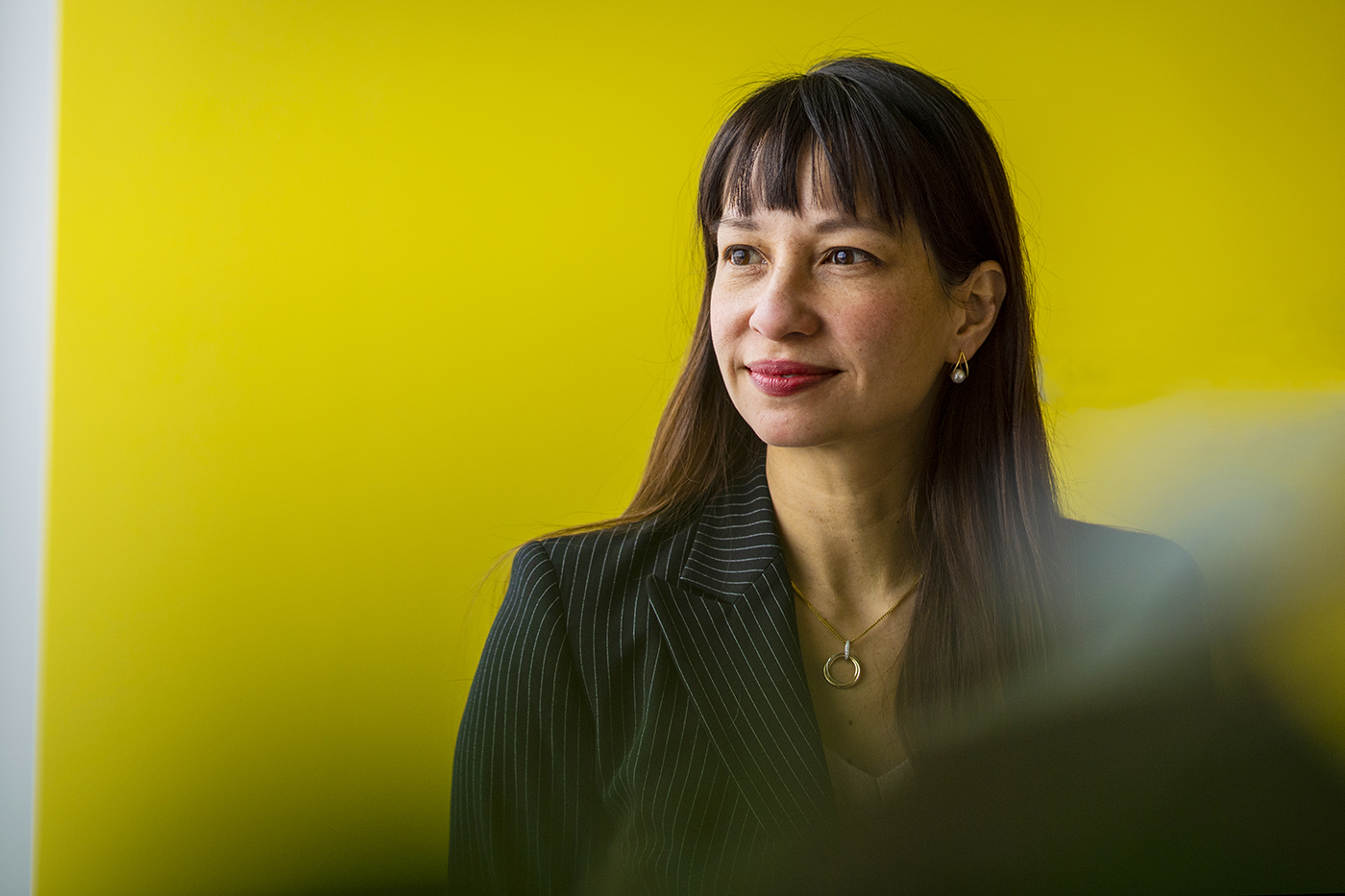Vladimir Putin aimed to weaken Western alliances. He is strengthening them instead.

This report is part of ongoing coverage of the Russia-Ukraine war. Visit our dedicated page for more on this topic.
As Russian forces were approaching Kyiv, the European Union was making progress Tuesday on an extraordinary effort to hasten Ukraine’s application for membership. The unprecedented show of support followed an emotional speech to the EU by Ukrainian President Volodymyr Zelenskyy, who is emerging as a leader on behalf of democracy around the world.
“We are fighting to be equal members of Europe,” said Zelenskyy, as his translator relayed the message through tears. “Do prove that you are with us. Do prove that you will not let us go. Do prove that you are indeed Europeans, and then life will win over death and light will win over darkness.

Mai’a Cross, the Edward W. Brooke Professor of Political Science and International Affairs. Photo by Alyssa Stone/Northeastern University
“The EU will be much stronger with us,” he said.
The endorsement by presidents of eight member states to immediately make Ukraine a candidate for EU membership is proof that Russian President Vladimir Putin’s invasion appears to be strengthening Western alliances, says Mai’a Cross, the Edward W. Brooke Professor of Political Science and International Affairs at Northeastern.
“Putin has created a much stronger EU,” says Cross. “This was actually predictable.
“Before the invasion, it was quite clear that an attack like this would bring liberal countries closer together. [Putin] was not able to calculate that. He hoped to divide up Europe and divide up the West. Those calculations are not panning out.”
Cross spoke with News@Northeastern about the EU’s response to the war and the emerging importance of Zelenskyy. Her comments have been edited for brevity and clarity.
Ukraine initially asked for immediate admission to the EU. The EU is responding by fast-tracking Ukraine’s application as a candidate. What is the difference between these two approaches?
The process of getting a new member into the EU is a highly legalistic one. There are very clear checklists that have to do mainly with democracy, free market economy, and the rule of law. Most new member states go through a process that lasts years and often involves changes to their constitutions so that they line up with the EU.
What is more realistic is to create a new EU infrastructure that will allow Ukraine and other countries to have closer geostrategic ties with the European Union without being full members. It’s a good, in-between ground that would serve to really focus on the strategic side of things that these countries clearly need, while not sort of causing a shock to the system by bringing them in fully to the EU. And that could be done relatively quickly. This is something that EU leaders are talking about right now as they start to rethink the security approach in Europe.
There’s this dawning realization that something credible has to be done in the European neighborhood, so that these countries that are on the edges feel as though the relationship with Europe is strong, especially because of Russia.
What will be the outcome of the attempt to hasten Ukraine’s candidacy?
My best guess is the EU—given this unprecedented circumstance—could very well allow Ukraine to become a formal candidate for membership. It would send a powerful signal politically to Russia that the EU is serious about standing up for democracy and the integrity of the European order.
I would be completely shocked if the EU said that Ukraine is a member. But who knows? This is a crazy time.
Would Ukraine’s EU candidacy have a deterring effect on Russia?
It would not stop the military campaign, but it would really drive home this message that Putin has seemed unable to understand since day one—that the West stands together, that this is unacceptable, and that Putin’s aggression has brought European member states together in a way that we haven’t seen in quite a while.
Zelenskyy has said that Russia intends to hunt him down and assassinate him. What do you make of Zelenskyy’s role in galvanizing the response to Putin?
Zelenskyy’s emergence as a brave and honorable leader is undeniable. He offers a sense of inspiration for fledgling democracies around the world. He is a very compelling, charismatic leader and that has helped to bring Europe together and strengthened the alliance, because his pleas for support can’t be ignored. He’s out there on behalf of the whole liberal international order, fighting for democracy and risking his life.
There is something about crisis that can often bring out the best in people, and he clearly is a born leader.
He has managed to capture leaders’ emotions in terms of understanding that this is the moment to stand up for democracy. You see tears in the eyes of leaders as he’s speaking to them. You hear people’s voices cracking as he pleads with them to do as much as they can.
The potential loss of Zelenskyy through this invasion, which is absolutely possible, would make him a martyr for this cause. It would be incredibly devastating if he were to be assassinated. The outrage would be all the greater.
The EU is little more than 70 years old. Are we seeing it transform into a federation with a soul?
People assume that the EU is mainly a trading bloc, and that the moment that it stops giving economic profit to member states, then they might consider leaving—as we saw with Brexit and the U.K. But if you look at opinion polls throughout the history of the EU, when regular citizens are asked, ‘What is the best benefit of Europe?’ they routinely say it’s the fact that [the idea of] Europe has brought peace to the continent. More people feel they are European in addition to their national identities than not.
I’m not fully surprised at how much the EU has stepped up to the plate in this crisis. My book, “The Politics of Crisis in Europe,” goes through major existential crises in the 21st century and explains how after each of these crises, the EU comes together more strongly. There’s a stronger sense of European identity. There is a convergence of beliefs about the benefit of Europe.
Which European reactions to the Ukraine war have been most surprising?
Countries like Poland, Hungary, and the Czech Republic, that were headed towards illiberalism were Europe’s biggest problem two weeks ago. They have sharply reversed and are now standing close with the rest of Europe. These were countries that many said were basically little brothers of Russia.
Looking now at Poland, they’re taking the lion’s share of the refugees from Ukraine and welcoming them with open arms—when in the past they have not been as open to refugees and migrants.
This has been the pattern of these existential crises in the 21st century: When you’re looking over the cliff and saying, ‘Are we really done with the EU?’ the loyalty is there.
You’ve discussed the constructive responses within Europe. But as the conflict approaches its second week, what is your biggest fear?
My fear is based on analyses of Putin’s mental state—that he will persist. It’s frightening that he would ever invoke the use of nuclear weapons. And the fact that he is now moving into a phase of the invasion that directly targets civilians is really horrifying on so many levels.
I do think that in the coming days we are going to see very, very sad scenes of death and destruction play out. And while it might bring Europe and the world closer together to support humanity and human rights, there is still this brutal dictator who has more nuclear weapons than the United States. So despite my optimism about the reaction from the West and the world, overall, I am actually quite concerned and pessimistic when it comes to what Russia is capable of doing in the coming days and weeks.
For media inquiries, please contact Marirose Sartoretto at m.sartoretto@northeastern.edu or 617-373-5718.






